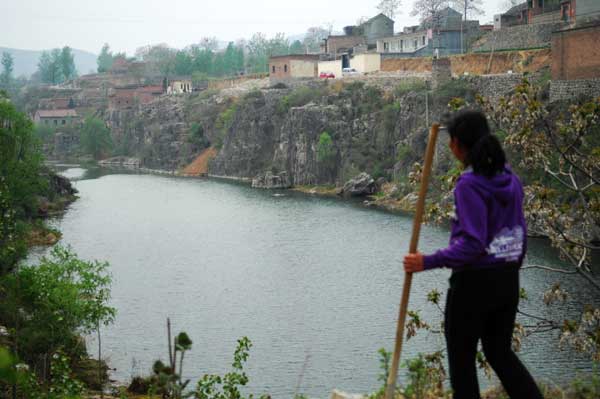 |
|
The Qihe River is the sole source of drinking water for Dangjie village, in Linzhou, Henan province. Villagers said the river has been polluted in recent years by businesses upstream. XIANG MINGCHAO / CHINA DAILY |
For Feng Cuiqin and her neighbors, one of the most frightening things is drinking the water, which they fear causes cancer.
Feng, 60, from Dangjie village in Linzhou, a county-level city in Central China's Henan province, said that the Qihe River, which runs through the mountainous region, is the sole source of drinking water for the village of nearly 1,100 people.
"The river has been polluted in recent years by some villagers, who farm fish upstream," Feng said. "They dump chicken feces into the river as fish fodder, and that has brought lots of bacteria and viruses."
During a visit by China Daily in late April, Feng talked unhappily about the vegetable patch in front of her house, which is irrigated with river water.
|
||||
Having suffered from hemiparalysis - paralysis of one side of the body - for years, Feng said that the water caused her to become weaker. Since her right arm and leg occasionally go numb, she's been virtually unable to work on the farmland.
She attributed the death of her husband to the "dirty water". Her husband was diagnosed with pancreatic cancer in January 2010 and died about 10 months later, aged 57.
Feng can't produce any scientific proof to support her view. But she said the river must play some role in the fact that cancer fatalities in her village are much higher than in neighboring villages that get their drinking water from deep wells.
Feng and other villagers claim that at least 41 villagers have died since 2009, and more than half of the deaths were caused by cancer.
In the past, usually about half a dozen people died each year of old age. The overall death rate has been rising in recent years, and more people are dying in their 20s or 30s, Feng said.
"Four people have died since the Spring Festival" - New Year's Day on the Chinese lunar calendar - which fell on Jan 23 this year, she said. "All of them died of cancer."
Cheng Songqin, a doctor in Dangjie, said the village's cancer rate was the highest among more than 40 villages in the local township. She has reported this phenomenon to the county government for several years but received no response.
The number of cancer patients in the village has increased at a pace of at least five to six annually since 2009, according to the China Economic Weekly, a magazine run by the People's Daily newspaper, which exposed the case on April 10.
Feng and other villagers visited by China Daily in late April confirmed the data in the magazine's report.
Statistics released during the 31st World Cancer Congress in August 2010 show that the average incidence of cancer in China is about 180 cases per 100,000 people. The rate in Dangjie in the past three years was nearly 100 times higher.
